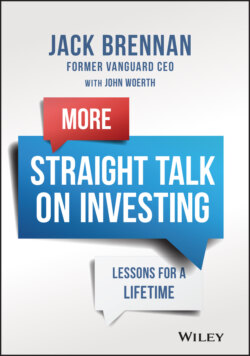Читать книгу More Straight Talk on Investing - John J. Brennan - Страница 18
Stocks
ОглавлениеStocks represent ownership. If you own a share of Google stock, then you are a part-owner of Google. That gives you the right to vote on certain policy issues, and it means that you share in the company's business results. If the company does well, you can benefit in two ways: (1) The value of your stock rises, so you could sell it at a profit if you so desire, and (2) The company passes along profits to you and the other owners in the form of a dividend. On the other hand, if the company does poorly, your stock can fall in value and dividend payouts can be cut or ceased altogether. In the worst case, the company could go bankrupt and leave your stock utterly worthless.
What makes a company do well or poorly? There are many variables. A company with prudent management, a sound business strategy in an attractive industry, and high-quality products or services that steadily sell is likely to do well. But other, external forces will also affect a company's prospects. These forces include interest rates and other economic factors, new technologies, competition, government regulation and legislation, and customer preferences. In addition to all those pragmatic influences, a company's stock can rise or fall due to investor sentiment, which is fickle and more difficult to forecast than the weather. In addition, even the smartest company leaders can make mistakes that affect the stock price. As such, many people view stocks as the riskiest investment among the three asset classes.
Stocks are risky—over the short term. As traders constantly second-guess each other about market trends and analysts make predictions, stock prices jump around from day to day and month to month. However, over long periods, stocks as a group have rewarded investors more than any other investment. Since 1926 through 2019, stocks have provided average annual returns of 10.3% a year.
A final note: Stocks are often called equities.
